Salvador Dalí will take your call via lobster phone
- Oops!Something went wrong.Please try again later.
An AI Salvador Dalí is now taking questions at The Dalí Museum.
The AI Dalí can answer questions about his work and was created using OpenAI's GPT-4.
The use of AI to recreate the likeness of celebrities raises ethical questions about consent.
Salvador Dalí is now a lobster phone call away.
The Dalí Museum in Florida recently unveiled a copy of Dalí's "Lobster Telephone" sculpture that allows visitors to call an AI version of the famous artist.
The robo-Dalí can answer questions about his paintings and prints when people speak into the receiver, according to a YouTube video from the museum.
"For years, people have attempted to understand my work, trying to find meaning in this real, to make sense of the dreams of a historic genius," the AI Dalí says in the video. "But how can anyone possibly know what is inside the burning mind of Salvador Dalí? No, they simply cannot. They are mere mortal human beings. But now, I can tell you."
AI Dalí explains that he came into being using a large language model and a recreation of his voice — though he also clarifies that this is far beyond his understanding.
Goodby Silverstein & Partners, the ad agency behind the crustacean-themed phone, used information about Dalí sourced from OpenAI's GPT-4 and voice samples from archival interviews to put together a convincing-sounding Dalí dupe, the company shared with Business Insider.
In the video demo, actors asked about Dalí's art ("Why are the clocks melting?") or his quirky, upturned mustache. Martin Pagh Ludvigsen at Goodby Silverstein & Partners told Business Insider that since the museum unveiled the phone on April 11, Dalí has been fielding between 400-500 questions a day.
What Ludvigsen found from analyzing Dalí's answers is that real visitors will ask the artist just about anything — even love advice.
"Any question about love will go back to his love for his wife, Gala," Ludvigsen said.
Business Insider tested the bot by asking it questions about Dalí's artwork. The bot speaks with grandiose, flowery language, often injecting references to surrealism, dreams, life, and death — subjects the real Dalí explored on the canvas.
Dalí also revealed that he is not a frequent reader of this publication.
"Business Insider, you say? I sip from the cup of imagination, not from the trough of market fluctuations. When I seek to understand the world, it is the surreal, not the stock exchange, that whispers its secrets," Dalí said.

There are some limitations to its accuracy. Because of its guardrails, it tends to be more upbeat than the real Dalí may have been in certain situations, Ludvigsen said.
There's also the issue of AI hallucination — where models spit out answers that have no basis in reality. Ludvigsen pointed out, however, that hallucinations can work in their favor, considering the real Dalí's mind often worked outside reality.
AI has become a popular tool for businesses and fans to recreate the likeness of well-loved celebrities, alive or dead. Some celebrities are enthusiastically on board. Still, it raises ethical questions about those who cannot consent.
Recently, South By Southwest attendees got to speak to an AI chatbot of famed actor Marilyn Monroe. Although Monroe's estate signed off on using her likeness, we'll never know if Monroe herself would have wanted to be used for an AI demonstration at a festival in Texas.
And on Friday, artist Drake used the AI voice of celebrated rapper Tupac Shakur in a diss track aimed at Kendrick Lamar.
Ludvigsen told BI that he and his team had thought through this ethical quandary — and continue to consider it as other clients express interest in replicating the experience with different artists.
"If we were to recreate another artist this way, I would want to make sure that we could point to evidence in their writings or their art or even maybe their foundations — whatever they have left behind — that this is something this artist would want us to do," Ludvigsen said.
As for whether Dalí would approve of his likeness being used, AI Dalí told BI that becoming digitized is a "splendid metamorphosis."
And Dalí scholar Elliott King told NPR he believes the late artist may enjoy knowing his voice will live on through his lobster phone.
"He was so interested in scientific advancements," King told the publication. "I think that he would have been really tickled by people talking into this lobster phone."
Read the original article on Business Insider

